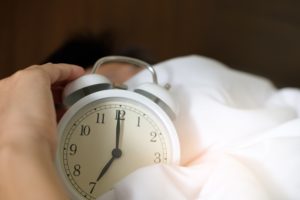Treatment of Insomnia
Treatment of Insomnia consists of medications as well as therapies. For medications, it is suggested to consult a professional; never self-medicate. Here we have discussed some of the behavioural therapies/modifications which have proven effects on sleep improvement.

1. Maintain Sleep Hygiene
Maintain regular sleep schedule
Try to go to bed and wake up at fixed time every day. Setting an alarm clock for waking up every morning at the same time may help.
Do regular exercise
Some physical activity will help you to get good sleep. But do not do it just before going to bed.
Avoid daytime naps
This may make you feel not sleepy till late at night.
Avoid stimulants
Like tea, coffee or nicotine. If you are unable to completely stop using them, then at least don’t drink tea or coffee after 5 in the evening. Do not take smoking breaks by getting up from bed when not getting sleep.
Avoid using alcohol
Alcohol has negative effects on the sleep centres in the brain. Regular alcohol consumption leads to sleep disturbances.
Keep yourself and the bed clean
You can take a hot shower before going to bed. Also don’t go to bed hungry, you can take a light snack if you are feeling hungry. Heavy meals just before going to bed are not healthy.

2. Stimulus Control
Use the bed and the bedroom only for sleeping
Do not watch T.V., have food, read or gossip while sitting on bed.
Keep the bedroom completely dark and quiet and the bed clean while going to bed
Go to bed only when feeling sleepy and want to sleep
Do not watch clock/time again and again if not getting sleep
If not getting sleep for 10-20 minutes, leave the bedroom and get indulged in some other activities
Return to bed only when again feeling sleepy. While not seeing clock/time, 10-20 minutes can be calculated as repositioning yourself twice while trying to sleep.
Wake up at regular time every day
And do not take naps during daytime as explained in the sleep hygiene.

3. Muscle Relaxation Training
Muscular tension hinders in proper sleep. Proper training of progressive muscular relaxation with imagery-guided therapy is done by professionals. Here are links for self training of muscular relaxation which one can practice.
Progressive Muscle Relaxation Guide – English
Progressive Muscle Relaxation Guide – Hindi
Muscle relaxation training is beneficial in reducing anxiety/stress levels and is also found helpful in Depressive Disorders. One can perform this relaxation exercise 3-4 times daily. Performing this exercise before sleeping helps in reducing excessive thoughts and calms our body.

